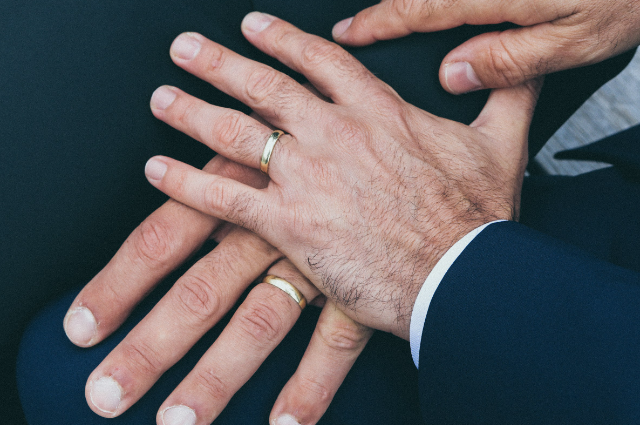
Photo by Nick Karvounis on Unsplash
The concept of love has evolved significantly, adapting to diverse social changes and needs that have led to the attraction between individuals of the same gender. While this phenomenon may be viewed as contrary to traditional norms, it has been embraced and legally recognized in various nations around the world. - Plato
The Dialogue Symposium nuanced view of love, suggesting that the highest form of love transcends physical attraction and leads to a deeper understanding of beauty and truth acknowledging the value of same-sex relationships as a means of intellectual and spiritual connection, indicating that love can manifest in various forms beyond traditional norms.
Some argue that the acceptance and recognition of same-sex marriage can have implications for moral principles and societal strategies, occasionally clashing with established customs and traditions. This shift may challenge certain legal frameworks, though it does not necessarily contravene societal conventions but light upon global trends.
International human rights instruments, particularly Article 16 of the Universal Declaration of Human Rights, affirm the right to marry without discrimination, advocating for equality and reinforcing principles surrounding consent to marriage and the minimum age for marriage. In a significant advisory opinion issued in 2018, the Inter-American Court of Human Rights declared that member states of the American Convention on Human Rights must recognize same-sex marriage as a fundamental right. This evolving legal landscape is mirrored by public opinion polls indicating a growing acceptance of same-sex marriage and the legalization of cohabitation arrangements, particularly aimed at advancing LGBTQ+ rights.
However, numerous countries continue to resist this shift due to their diverse cultural contexts and religious convictions, which often bind legal principles to traditional norms. This resistance creates a complex interplay between evolving societal values and entrenched customs, as many nations grapple with reconciling these differences. The legal discourse surrounding same-sex marriage, once deemed criminal in some jurisdictions, is now on the cusp of transformation, reflecting a broader re-evaluation of societal norms and legal frameworks regarding love and partnership.
I assert that granting equal rights to same-sex couples regarding marriage and adoption is fundamentally about upholding dignity within society. However, many countries still deny these rights, particularly in matters of guardianship and adoption. While initiatives like the Trivea project focus on the psychological well-being of children, the legal landscape for LGBTQ+ individuals remains fraught with challenges. The argument that recognizing same-sex marriage or adoption undermines traditional customs lacks historical support; indeed, similar attitudes towards bisexuality and same-sex relationships have persisted since the Middle Ages without leading to societal collapse.Historically, societies have navigated complex views on sexuality, often oscillating between acceptance and condemnation. The legal prohibitions against same-sex relationships, once considered criminal, are now being challenged as more nations recognize the importance of inclusivity and equality. The evolution of societal norms demonstrates that integrating LGBTQ+ rights into legal frameworks does not erode cultural traditions but rather enriches them by fostering a more inclusive understanding of family and partnership. As we move forward, it is crucial to acknowledge that the dignity of all individuals—regardless of sexual orientation—should be upheld in our legal systems and societal structures.
What if two advanced robots were to create an offspring through technological means? In such a scenario, the question of parentage becomes complex, as both male and female robots could potentially claim the child as their own. This situation raises intriguing legal and ethical considerations, particularly given that the identity of the offspring may not be easily classified. Ultimately, the determination of parentage would rest in our hands, challenging traditional notions of family and identity in a rapidly evolving technological landscape.
Legalizing same-sex marriage can significantly contribute to economic growth by attracting highly skilled workers. A study conducted by researchers at Washington State University revealed that European countries which recognized same-sex marriage experienced a notable decrease in the emigration of skilled workers to the United States. This trend highlights how inclusive policies can enhance a nation's appeal to top talent.
Furthermore, legal recognition of same-sex marriage increases financial security for couples by granting access to spousal benefits, including health insurance, tax advantages, and inheritance rights. These benefits are particularly impactful when compared to their unmarried counterparts, leading to improved economic stability for same-sex couples.
In addition to these financial benefits, the legalization of same-sex marriage has been linked to enhanced public health outcomes. Studies indicate that access to marriage correlates with better health insurance coverage and overall health improvements among LGBTQ+ individuals, aligning with global trends towards greater inclusivity and acceptance.
Overall, the recognition of same-sex marriage not only fosters a more equitable society but also stimulates economic advancement by creating a more attractive environment for skilled labor and promoting the well-being of all citizens.
